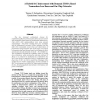Free Online Productivity Tools
i2Speak
i2Symbol
i2OCR
iTex2Img
iWeb2Print
iWeb2Shot
i2Type
iPdf2Split
iPdf2Merge
i2Bopomofo
i2Arabic
i2Style
i2Image
i2PDF
iLatex2Rtf
Sci2ools
127
click to vote
VLSID
2006
IEEE
2006
IEEE
A Hybrid SoC Interconnect with Dynamic TDMA-Based Transaction-Less Buses and On-Chip Networks
The two dominant architectural choices for implementing efficient communication fabrics for SoC's have been transaction-based buses and packet-based Networks-onChip (NoC). Both implementations have some inherent disadvantages ? the former resulting from poor scalability and the transactional character of their operation, and the latter from inconsistent access times and deterioration of performance at high injection rates. In this paper, we propose a transaction-less, time-division-based bus architecture, which dynamically allocates timeslots on-the-fly ? the dTDMA bus. This architecture addresses the contention issues of current bus architectures, while avoiding the multi-hop overhead of NoC's. It is compared to traditional bus architectures and NoC's and shown to outperform both for configurations with fewer than 10 PE's. In order to exploit the advantages of the dTDMA bus for smaller configurations, and the scalability of NoC's, we propose a new hybrid SoC ...
Computer Architecture | Current Bus Architectures | Time-division-based Bus Architecture | Traditional Bus Architectures | VLSID 2006 |
| Added | 01 Dec 2009 |
| Updated | 01 Dec 2009 |
| Type | Conference |
| Year | 2006 |
| Where | VLSID |
| Authors | Thomas D. Richardson, Chrysostomos Nicopoulos, Dongkook Park, Narayanan Vijaykrishnan, Yuan Xie, Chita R. Das, Vijay Degalahal |
Comments (0)

